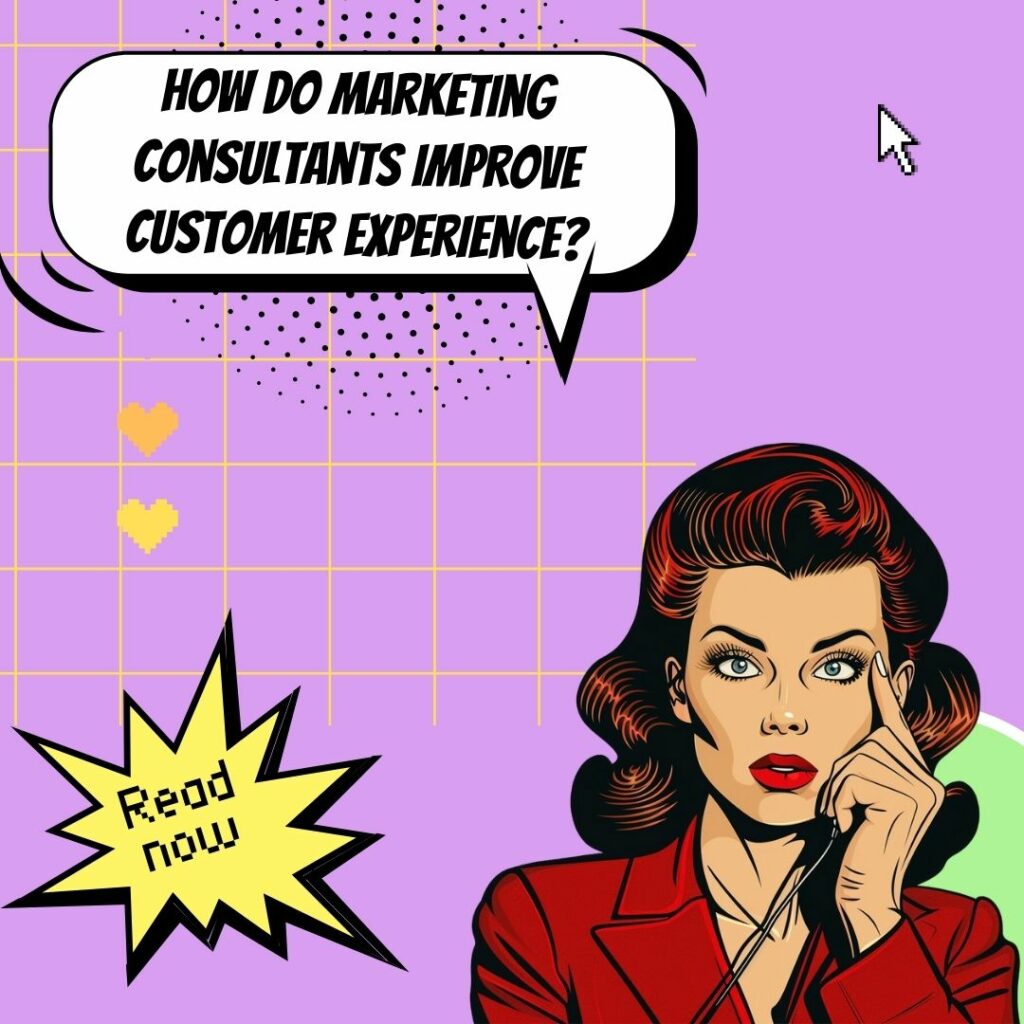Key Takeaways
✅ Marketing Consultants Help Identify and Understand Customer Needs: By using tools like surveys and social media listening, consultants gather data to pinpoint customer preferences and issues. Implementing targeted strategies based on this analysis can increase customer satisfaction and loyalty.
✅ Marketing Consultants Develop Omnichannel Experiences that Meet Customers Where They Are: Consultants ensure seamless interactions across various channels, creating a consistent customer experience. Solutions like mobile apps and chatbots help cater to customers' needs across different platforms.
✅ Marketing Consultants Measure and Optimize Customer Experience Using Data-Driven Insights: Setting key performance indicators and tracking metrics allow consultants to evaluate the effectiveness of CX initiatives. With data-driven recommendations, businesses can continuously enhance customer satisfaction and retention.

Introduction
Marketing consultants play a crucial role in enhancing customer experience by leveraging their strategic insights and innovative solutions. In today's competitive market, delivering exceptional customer experiences is vital for building loyalty and driving business growth. Marketing consultants help businesses understand customer needs and preferences, ensuring that every interaction is meaningful and engaging.
By analyzing customer data and feedback, marketing consultants develop tailored strategies that improve touchpoints across the customer journey. From refining communication channels to personalizing marketing efforts, these experts ensure that businesses can create positive, memorable experiences for their customers. This focus on customer experience not only increases satisfaction but also fosters long-term relationships and brand loyalty.
Top Statistics
| Top Statistics | Insight |
|---|---|
| 73% of all customers point to experience as an important factor in their purchasing decisions, behind price and product quality. | This underscores that excellent customer experience is almost as critical as product price and quality, highlighting the importance of marketing consultants in honing customer interactions. |
| 85% of brands believe they offer personalized customer experiences, but only 60% of consumers agree. | There is a clear gap between brand perception and customer reality, which presents an opportunity for marketing consultants to bridge this gap through tailored strategies. |
| Customer experience is considered a primary competitive differentiator by 44.5% of organizations globally. | Businesses increasingly rely on customer experience to stand out in the competitive market, making the role of marketing consultants vital in crafting standout customer journeys. |
| Companies that put in work to improve the customer experience see a 42% improvement in customer retention, a 33% improvement in customer satisfaction, and a 32% increase in cross-selling and up-selling. | Investing in customer experience not only enhances satisfaction but also directly impacts a company’s bottom line through better retention and increased sales. |
| 40% of Gen Zers feel more loyal to brands now than last year. | The rising loyalty among Gen Z highlights the need for personalized marketing approaches catered to this segment, where marketing consultants can significantly contribute. |
The Importance of Customer Experience Enhancement
Customer experience (CX) is increasingly recognized as a critical differentiator for businesses today. Studies have shown that superior CX can lead to increased customer retention, higher conversion rates, and an improved brand reputation, ultimately driving financial growth. By understanding and leveraging customer behaviors, businesses can identify which interactions contribute positively to their bottom line. In an era where customers expect more personalized and efficient service, enhancing CX is no longer optional but essential for staying competitive.
The Role of Marketing Consultants
Marketing consultants play a significant role in elevating customer experience. They bring a wealth of expertise in data analytics, customer journey mapping, and user feedback to identify pain points and untapped opportunities for improvement. These professionals introduce innovative strategies that transform business-to-customer interactions, leading to more personalized, efficient, and enjoyable experiences. If you want to see your customer satisfaction soar, it might be time to consider what a marketing consultant can offer.
Key Factors to Consider When Choosing a Marketing Consultant
Finding the right marketing consultant can feel like a daunting task, but focusing on certain key factors can help. Look for expertise and specialization in customer experience. Does their approach to customer insights and data analysis resonate with your company's strategic vision? Are they up-to-date with the latest technology and innovative solutions? Cultural fit and scalability are also important; you want a partner who will grow with your business. Finally, check for client references and case studies that show tangible improvements.
Services Offered by Marketing Consultants
Marketing consultants bring a suite of services designed to elevate the customer experience. They can design customer episodes to transform CX at scale and develop strategic roadmaps for continuous improvement. Leveraging user-centered approaches like empathy maps and journey maps, these experts also address business-centered challenges through process modeling and service blueprinting. From industrial design and UI design to interaction and service design, the services are expansive and geared toward creating a seamless customer experience.
Benefits of Partnering with Marketing Consultants
Partnering with marketing consultants offers numerous benefits. Enhanced customer satisfaction and loyalty often lead to increased retention and higher conversion rates, directly impacting your bottom line. An improved brand reputation becomes a natural consequence of satisfied customers. Furthermore, collaboration with consultants can lead to skill transfer, empowering your team and fostering a culture of continuous improvement within the organization.
Best Practices for Successful Collaboration
For a successful collaboration with a marketing consultant, start with a clear understanding of your organization’s specific needs and goals. Evaluate the consultant’s methodology and approach to ensure it aligns with your vision. Open communication is crucial; effective partnerships are built on trust and transparency. Co-create solutions tailored to address your unique challenges and opportunities. By following these best practices, you can maximize the benefits of this collaborative endeavor and see significant improvements in customer experience. By focusing on these areas, businesses can not only meet but exceed customer expectations, creating a positive ripple effect that touches every part of the organization.
AI Marketing Engineers Recommendation
Recommendation 1: Leverage Data Analytics to Understand Customer Preferences: According to a 2022 survey by PwC, 73% of customers see customer experience as an important factor in their purchasing decisions. Marketing consultants should focus on using data analytics tools to track and analyze customer behavior. By doing so, they can gain detailed insights into what customers prefer and tailor the experience accordingly. Implementing platforms like Google Analytics or Adobe Analytics helps businesses understand these preferences and make informed decisions to enhance the overall customer experience.
Recommendation 2: Personalize Customer Interactions Through Advanced Segmentation: Recent trends indicate a growing demand for personalized experiences, with a study by Epsilon revealing that 80% of consumers are more likely to make a purchase when brands offer personalized experiences. Marketing consultants can exploit advanced segmentation techniques to effectively target different customer segments. By grouping customers based on demographics, purchase history, and behavior patterns, businesses can create bespoke marketing messages, offers, and services that resonate more powerfully with each segment, thereby boosting customer satisfaction and loyalty.
Recommendation 3: Integrate AI-Powered Customer Support Tools: The use of AI in customer service is on the rise, with Gartner predicting that by 2025, AI will handle 95% of all customer interactions. Marketing consultants should recommend integrating AI-powered tools like chatbots and virtual assistants to improve customer support efficiency. These tools can provide instant responses to customer inquiries, process requests quickly, and offer round-the-clock support, thereby enhancing the customer experience by ensuring timely and relevant assistance.
Relevant Links
- Unlock the Secrets of Market Penetration and Growth
- Boost Your Marketing with Personalization
- Discover Key Factors for Impactful Campaign Goals
- Leverage User Behavior for Better Insights
Conclusion
In today's competitive market, customer experience enhancement has emerged as a pivotal factor for business success, impacting everything from customer retention to brand reputation. The importance of superior customer experience cannot be understated, as it leads to higher conversion rates and fosters long-term customer loyalty. Marketing consultants play a critical role in this landscape by bringing specialized knowledge in data analysis, customer journey mapping, and user feedback. Their capability to pinpoint areas for improvement and implement innovative strategies transforms the way businesses engage with their customers, making interactions more personalized and efficient.
When selecting a marketing consultant, businesses should consider factors such as the consultant’s expertise in customer experience, their approach to data analysis, and their strategic vision. Additionally, the use of modern technology, cultural fit, and proven success in past projects are essential for a fruitful partnership. By partnering with skilled marketing consultants, companies can achieve enhanced customer satisfaction, better retention rates, and a stronger brand reputation. This collaboration not only drives direct financial benefits but also empowers internal teams through skill transfer and shared knowledge.
Ultimately, marketing consultants offer invaluable services that help businesses navigate the complexities of modern customer experience enhancement. As companies continue to evolve, investing in these expert partnerships will be crucial for staying ahead of the curve and meeting the ever-changing demands of today's customers.
FAQs
Question 1: What is the primary goal of customer experience (CX) consultants?
Answer: The primary goal of CX consultants is to help businesses improve their customer interactions, leading to increased customer satisfaction, loyalty, and ultimately, business growth.
Question 2: Why is customer experience important?
Answer: Customer experience is crucial because it differentiates businesses from their competitors, drives customer retention, and directly impacts the bottom line.
Question 3: What are the key factors to consider when choosing a CX consultant?
Answer: Key factors include expertise, approach to customer insights, strategic vision, technology and innovation, cultural fit, client references, and scalability.
Question 4: How do CX consultants leverage data analytics and customer journey mapping?
Answer: They use these tools to identify pain points, opportunities for improvement, and to develop personalized, efficient, and enjoyable customer interactions.
Question 5: What is the role of Net Promoter System (NPS) in CX consulting?
Answer: NPS is a benchmarking tool that helps measure customer satisfaction and loyalty, providing insights for improvement.
Question 6: How do CX consultants ensure a collaborative approach with clients?
Answer: They work closely with clients, understanding their unique needs and goals, and provide tailored solutions that align with the client's culture and objectives.
Question 7: What should businesses look for in a CX consulting firm?
Answer: Look for firms that focus on your needs, are self-aware of their limitations, and offer a range of services aligned with your business objectives.
Question 8: How can businesses ensure a successful CX initiative?
Answer: Ensure a collaborative approach, prioritize open communication, and select a consultant who values partnership and skill transfer.
Question 9: What are the benefits of a streamlined customer experience?
Answer: Benefits include better user experience, simplified processes, reduced costs, and more loyal customers.
Academic References
- Lemon, K. N., & Verhoef, P. C. (2016). Understanding customer experience throughout the customer journey. Journal of Marketing, 80(6), 69-96. This study emphasizes the importance of considering the entire customer journey when enhancing customer experience, highlighting the role of marketing consultants in managing customer touchpoints and interactions.
- Homburg, C., Jozić, D., & Kuehnl, C. (2017). Customer experience management: Toward implementing an evolving marketing concept. Journal of the Academy of Marketing Science, 45(3), 377-401. This research focuses on the evolving nature of customer experience management, highlighting the need for marketing consultants to adapt and innovate their strategies to meet changing customer expectations and preferences.
- Bolton, R. N., Gustafsson, A., McColl-Kennedy, J. R., Sirianni, N. J., & Tse, D. K. (2014). From customer experience to human experience: Uses of systematized and non-systematized knowledge. Journal of Service Management, 25(2), 165-175. This study explores the shift from customer experience to human experience, emphasizing the role of marketing consultants in creating personalized and emotionally resonant experiences that foster deeper connections with customers.
- Edelman, D. C., & Singer, M. (2015). Creating value through transforming customer journeys. McKinsey Quarterly, 1, 17-29. This work by McKinsey emphasizes the importance of a customer-centric approach, highlighting the need for marketing consultants to prioritize customer needs and preferences when designing and implementing customer experience strategies.












